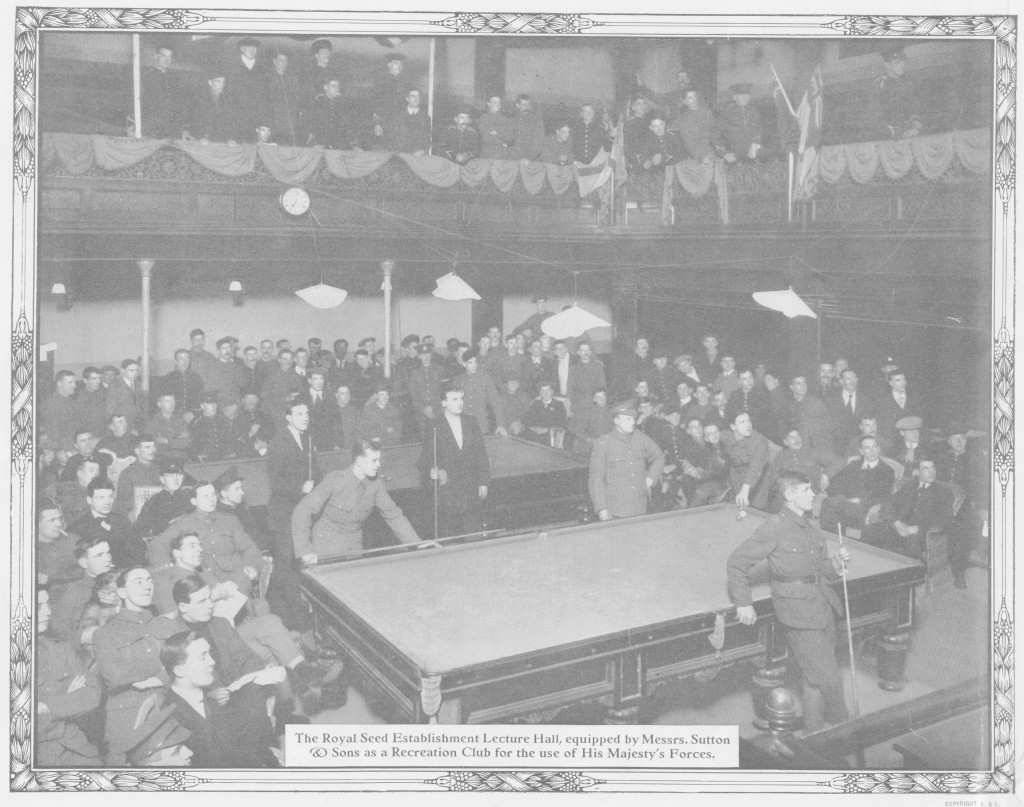One hundred years ago huge efforts were being made to produce much needed home-grown food and to use all available land as “wisely” as possible. Suttons were very much at the forefront of this effort, not only supplying the necessary seeds but also offering help and guidance to those who had never before needed to produce their own food. The following letter was posted at the very front of the 2015 Suttons Seed catalogue.
The stupendous conflict in which almost the whole of Europe is engaged, and the constant vicissitudes of the war, have dwarfed many features of everyday life which under normal circumstances would demand attention. Although there can be little doubt as to the final issue, the nation from the very commencement grasped the fact that, for the good of all concerned, business must be carried on in as complete a manner as circumstances will permit, and in no section of trade is this more true than in the case of the great industry with which our House has been so prominently identified for more than a century.
The immense importance of producing at home foodstuffs of all kinds, on as extensive a scale as possible, was realised at the outset, and large quantities of vegetable seeds were supplied by us to clients throughout the kingdom in August last.
We wish to point out however, that, valuable, as the produce from the seed then sown has been (as evidenced by the unique collection of vegetables grown from seed sown since the war was declared, which we exhibited at the Royal Horticultural Society’s Show on November 17), it is but a drop in the bucket compared with the requirements in the near future and those who have ground available will do wisely to sow at least half as much again as usual, not only to furnish individual needs but to provide against any national emergency.
Market Growers are likely to reap a great advantage by largely extending the area which they generally cultivate, in view of the certainty of very limited consignments from the Continent.
A continuous supply of Vegetables throughout the year can easily be secured by judicious selection of suitable varieties, and by frequent sowings during spring, summer and early autumn.
For those who prefer to leave the choice up to us, we can, in the collections offered, not only provide for a regular succession of the best vegetables, but by including those varieties which are most productive, and of which we have made special provision, we can ensure very great economy to the purchaser. Where Customers desire to make their own selection, much saving may be effected by restricting the number of varieties and by ordering larger quantities of individual sorts. In such cases we are able to charge greatly reduced rates when the quantities come within the limits stated at the head of page 4 of our catalogue.
Nor can the Flower Garden be neglected without serious loss to the community. A summer without flowers is an impossibility in this country, which has been likened to one huge garden, and the science and practice of horticulture should be carried on in all its branches, both for its own intrinsic merit and for the good of the immense number who depend for their livelihood upon its continuance.
While, therefore, we may expect to see British gardens at least fully stocked as usual with both vegetables and flowers, the need for economy will be apparent to most, if not all, classes of society.
Economy with Efficiency has been the basis upon which our vast business has been built up, and in compiling our catalogue for 1915 we have endeavoured to keep the cost of seeds as low as is consistent with that efficiency which is absolutely essential. It is perhaps unnecessary to remind our patrons that “cheap seeds” are invariably the dearest in the end.
“It will be a satisfaction to those who have for so many years supported our House to know that we have been able to maintain our large staff at full time and on full pay, even though for several months of the year the demand for seeds is never in any way commensurate with the heavy weekly wages bill.
No fewer than 75 of our employees have responded to the call of their King and Country. Their places have been kept open and assistance given to the dependents of married men.
The strategic position of Reading, its comparative proximity to Southampton and Portsmouth, and its direct communication with all parts of the kingdom, have naturally resulted in considerable numbers of troops passing through the town. By adapting certain portions of our large premises and providing Recreation Rooms we have the satisfaction of knowing that much has been and still is being done to maintain that healthy and moral tone so essential to the welfare and training of His Majesty’s troops. The picture … would appear to indicate that the men are not slow to appreciate the opportunities afforded them.”

By January 1918 over 200 Suttons employees were fighting at the front as confirmed by the following excerpt from another letter.
“Letter to our Customers”
“Rapid Execution of Orders
Over two hundred of our trained expert employees having responded to the Empire’s call, their places had to be filled by others who were less experienced and last year it was not possible to avoid some delays in despatching orders. We have now been able, by extending our premises and still further augmenting our staff, to make arrangements as will, we are confident, lead to the prompter execution of orders, for which our House has been so justly noted.”

Last Updated on March 16, 2023 by Suttons Horticultural Team


